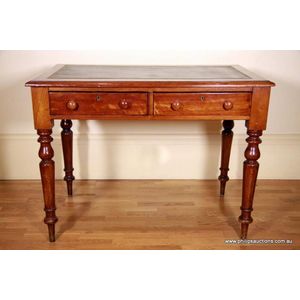German Exhibition Walnut Wash Stand, Circa 1880
You must be a subscriber, and be logged in to view price and dealer details.
Subscribe Now to view actual auction price for this item
When you subscribe, you have the option of setting the currency in which to display prices to $Au, $US, $NZ or Stg.
- Circa - A Latin term meaning 'about', often used in the antique trade to give an approximate date for the piece, usually considered to be five years on either side of the circa year. Thus, circa 1900 means the piece was made about 1900, probably between 1895 and 1905. The expression is sometimes abbreviated to c.1900.
- Burr - Burr (or in the USA, burl) is the timber from the knotted roots or deformed branch of the tree, which when cut, displays the small circular knots in various gradations of colour. It is always cut into a decorative veneer, most commonly seen as burr walnut on 19th century furniture.
- Turning - Any part of a piece of furniture that has been turned and shaped with chisels on a lathe. Turned sections include legs, columns, feet, finials, pedestals, stretchers, spindles etc. There have been many varieties and fashions over the centuries: baluster, melon, barley-sugar, bobbin, cotton-reel, rope-twist, and so on. Split turning implies a turned section that has been cut in half lengthwise and applied to a cabinet front as a false decorative support.
- Turned Legs - are legs which have been turned on a lathe. In use from the 16th century, turned legs on tables, chairs and cabinets became more frequent until, by the 1830s, the Georgian square or tapered leg was rarely found except in country pieces.
- Feather Banding - Inlaid banding found on the edges of tables, drawers and other items, where two strips of veneer are laid at right angles to each other, but at 45 degrees to the perimeter of the edge, to give a herringbone effect.
- Provenance - A term used to describe the provable history of an antique or work of art, and thus an additional aid to verifying its authenticity. Provenance can have an inflating effect on the price of an item, particularly if the provenance relates to the early settlement of Australia, a famous person, or royalty. Less significant are previous sales of the item through an auction house or dealer.
This item has been included into following indexes:
Visually similar items

A small Victorian leather topped desk. 19th century, having a tooled green leather top, a bullnose edge and two pine lined frieze drawers with simple timber handles, supported on turned and baluster legs. Height 76 cm. Width 103 cm. Depth 61 cm

Georgian oak side table, single recessed drawer on turned legs. Height 73 cm. Length 85 cm. Depth 53.5 cm

A small Victorian cedar leather topped desk. second half 19th century, the desk with an olive green tooled leather top above two drawers each with a pair of turned timber handles, raised upon slender baluster and turned legs. Height 78 cm. Width 105 cm. De

A transitional style kingwood parquetry desk, circa 1900, with a finely inlaid lattice weave top enclosing a deep cross banded border, the three frieze drawers and sides of similar decoration, delicate bell flower inlay to the canted corners above gently t
